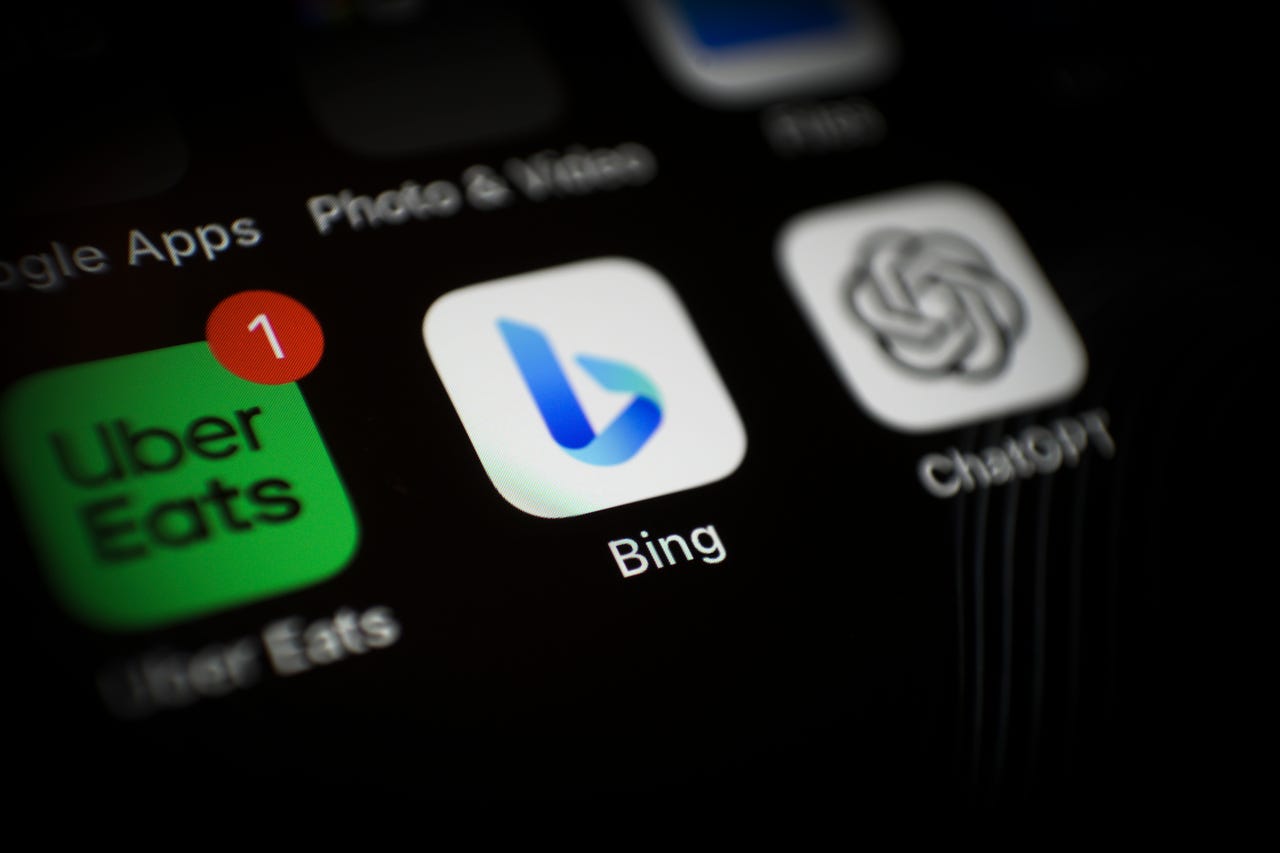Bing's search market share fails to budge despite big AI push


Microsoft has been aggressively touting Bing AI as an innovative and exciting way to enhance your searches with artificial intelligence. And though AI has certainly been a source of curiosity and interest for many people, the new capabilities of Bing have failed to jumpstart Microsoft's cut of the search engine market.
In February of 2023, Microsoft kicked off Bing AI Chat in a limited release that required you to join a waitlist to gain access. In May, the company eliminated the waitlist, thus opening up Bing Chat to anyone who wanted to give it a whirl. That means the AI had limited availability for its initial three months and wider availability for the almost three months since. But any drive to use the new AI has yet to translate into a boost for Bing's market share, at least based on the latest market stats.
Also: How to use Bing Chat (and how it's different from ChatGPT)
Statistics from market intelligence firm Statcounter show Bing's global search engine share at 2.99% in July, down slightly from 3.03% in January and up slightly from 2.76% in April. Data from web analytics firm Similarweb shows Bing's share at 3.23% in June, a number that's been relatively the same since the start of the year.
Web traffic metrics from analytics firm YipitData show a fluctuation in the number of visitors to Bing, from 95.7 million in February to 101.7 million in March to 96.4 million in April to 99.2 million in May and to 97.7 million in June. YipitData's usage stats include PCs but not mobile devices and excludes China from the global mix.
Also: The best AI chatbots of 2023: ChatGPT and alternatives
Amid the statistics from Statcounter, Similarweb, and YipitData, Microsoft is calling the new Bing a success, according to an article in the Wall Street Journal. The company also disputed the data from the analytics companies, claiming that their numbers don't measure all the people who go directly to Bing's chat page.
Statcounter, Similarweb, and YipitData said their data does take traffic to and from Bing's Chat into account, according to the WSJ. David F. Carr, senior insights manager for Similarweb, said that the stats may be missing some interactions but none that should be significant.
"Microsoft says their internal numbers show greater growth than we're reflecting," Carr told ZDNET. "It's possible that we're missing some of the Bing Chat interactions that use an Edge sidebar or extension, but I don't know how significant that is in the grand scheme of things."
Also: How to write better ChatGPT prompts for the best generative AI results
Further commenting on the matter, a Microsoft spokesperson shared the following statement with ZDNET:
"While we cannot comment on third-party data, we can share that Bing has grown to exceed 100 million daily active users. Our usage signals show strong growth since February and because of new access points like Bing Chat Enterprise, we've experienced one of our biggest growth months on record since we launched our new Bing and Edge experience. Already, our customers have engaged in over a billion chats and have created over 750 million images with Bing Image Creator."
Since its launch in July of 2009, Bing has faced an uphill battle against Google for a share of the search engine market. Google's global slice of this lucrative landscape has remained fairly consistent during the past several years at around 90%. For Google, Microsoft, Yahoo, and a few other companies, search is a key driver of revenue, mostly from advertisers who pay to place ads. In 2022, Google took in $162 billion from search-related ads, while Microsoft's Bing generated around $11 billion.
Trying to take advantage of the buzz around generative AI, Microsoft started by adding its chatbot to Edge and to the mobile Bing app. Through either one, you can ask questions, look for information, and generate content by chatting with the AI bot. In recent weeks, the company has expanded the Bing AI from Edge to other browsers such as Chrome and Safari in an attempt to attract more users.
Also: 4 ways to increase the usability of AI, according to industry experts
Beyond generating text, Bing can also devise an image based on your description. With the new visual search feature, you can add a photo or other image to your request and ask Bing to interpret it or answer questions about it. There's even an enterprise version of Bing AI for large organizations that want to offer and manage the use of the chatbot among their employees.
To avoid being losing ground, Google has been testing the integration of AI with its familiar search engine. Currently available as a Google Labs experiment, Search Generative Experience, or SGE, tries to enhance the usual search results with an AI-generated summary, sources, and suggested follow-up questions.
But the big question is whether or not AI can ultimately lure in more users to traditional search engines, and which search engines will fare best in this contest.
Also: How to use ChatGPT to write code
"The challenge is determining which tool we will predominantly use for this purpose," said Max Gomez, chief marketing officer of digital marketing firm The HOTH.
"From my perspective, users will likely gravitate towards Google when they have a clear idea of their search intent," Gomez added. "This is further supported by the introduction of SGE on the search engine results page, suggesting that Google is advocating for more comprehensive search queries beyond the traditional ones that focus solely on brand terms. On the other hand, I foresee a trend where users will increasingly turn to AI for specific answers, especially when exploring unfamiliar topics or specialized tasks like coding and programming."